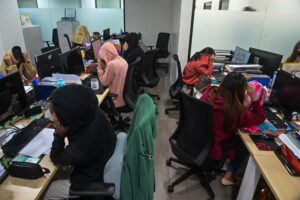Power is a multifaceted concept that varies in meaning across different contexts. Generally, it pertains to the capacity to wield control, command, and sway. Within the realm of international relations, it encompasses aspects such as economic and military might, as well as the capability of one entity to affect others via means of coercion, collaboration, or rivalry. Wealth, status, and social influence are considered when measuring a person’s strength. Since it is challenging to quantify an individual’s strength, they are not ranked by strength.
1. Xi Jinping
Xi Jinping is the President of China, Secretary General of the Chinese Communist Party, and one of the most powerful people in the world. In a 2022 Reuters article, he was considered the country’s most powerful leader since Mao Zedong, who founded the People’s Republic of China. In 2017, he changed the party’s constitution to include his political agenda: Xi Jinping Thought on Socialism with Chinese Characteristics. In what many see as authoritarianism, Xi oversees a country with the world’s largest (but not most powerful) military and second-largest economy.
2. Joe Biden
The current president of the United States invariably ranks among the world’s most powerful individuals. As of 2023, Joe Biden served as the 46th president. The United States boasts the world’s most formidable military, the strongest economy, and the third-largest population. Its extensive military has a global presence, with expenditures surpassing those of any other nation. Additionally, America wields significant cultural influence, with over 2 billion English speakers worldwide and a dominant presence in the global market through its movies, music, games, and television. Joe Biden’s prominence stems not only from his presidency but also from his extensive experience in foreign policy.
3. Vladimir Putin
Vladimir Putin has been the President of Russia and has held a leadership position as either president or prime minister since 1999. Prior to this, he served as a foreign intelligence officer for the KGB for nearly two decades. Russia, holding the world’s largest gas reserves and second-largest coal reserves, has seen its power increase even as its democratic structures have weakened. The Putin administration has been noted for imprisoning political rivals, curtailing the independent press, and manipulating electoral outcomes. Additionally, Russia has expanded its influence in the Middle East, solidified its relationship with China, and exerted military power in Crimea in 2014 and Ukraine in 2022.
4. Narendra Modi
Narendra Modi has served as the Prime Minister of India since 2014. With his Hindu religious beliefs, he has faced criticism for allegedly undermining democracy, individual rights, and freedom of expression during his tenure. Despite these controversies, Modi remains highly popular in India. The nation ranks as the fifth largest economy globally by nominal GDP and third by purchasing power parity. While not yet acknowledged as a superpower, India is progressing steadily. The World Bank reports that India is on course to reach upper-middle income status by 2047, having significantly reduced extreme poverty two years prior.
5. Olaf Scholz
Olaf Scholz has been the Chancellor of Germany since December 2021, having previously served as the finance minister and vice chancellor in Angela Merkel’s fourth cabinet. Germany boasts the fourth-largest economy by GDP globally and is the biggest in Europe. It is a leading exporter of chemicals, vehicles, and machinery, among other goods, benefiting from a highly skilled workforce. Additionally, Germany is the most populous country in Europe and, despite significant economic and military setbacks in both world wars, it is now regarded as the most influential nation in Europe.
Conclusion
The world’s most influential individuals exert sway across diverse domains such as politics, commerce, technology, and social activism. Their influence arises not just from official roles like state leaders or corporate executives, but also from their capacity to mold global discourse, spearhead innovation, and touch the lives of countless people. At the same time, prominent media, social justice, and cultural voices leverage their reach to spark transformation, question established standards, and engage audiences worldwide.
In essence, those wielding the greatest power are the ones who can mobilize financial, political, and societal influence to shape major events, propel technological progress, and catalyze societal shifts. In a world where everything is connected, their choices, breakthroughs, and leadership are crafting the legacy for the generations to come.
Disclaimer
The profiles of the world’s most influential individuals are compiled from publicly accessible data and impartial analysis. It’s crucial to recognize that power can manifest in various forms such as political clout, economic dominance, media visibility, or societal sway. The individuals listed may possess influence in one or several of these domains, but this does not imply they hold tangible rights or ownership.




